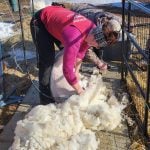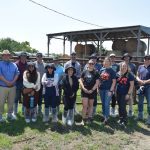Beginning in 2022, Loblaws has committed to buy pork from farms where sows are not kept in stalls.
The Canadian Federation of Humane Societies lauded Loblaws decision to move away from sow crates.
“This decision puts Loblaw on the side of animal welfare science and public opinion,” said Barbara Cartwright, the organization’s chief executive officer.
“Today’s announcement is a clear reflection of consumer expectations that food animals be treated humanely…. We strongly encourage farmers to strive to employ management practices and housing systems that meet both the physiological and psychological needs of the animals.”
Read Also

Above average temperatures expected
July was a cooler than average month right across the Prairies, with most places coming in just slightly below average.
Loblaws’ decision was part of a larger commitment April 29 by grocers who belong to the Retail Council of Canada.
“The Retail Council of Canada believes that sows should be housed in an environment where their pregnancy, health and well-being are taken into highest consideration, and that the selection of sow housing be based on a combination of sound science, stakeholder expectations and the long-term viability of the industry,” the council noted in a news release.
Loblaws, Canada’s largest grocery chain, has joined dozens of companies, including Tim Hortons, McDonald’s, Canada Safeway, Sobeys, Costco and Walmart, in committing to buy fresh pork products from sows raised in open housing or other systems, as defined by national codes of practice.
The Retail Council of Canada decision is a voluntary commitment to work toward “sourcing fresh pork products from sows raised in alternative housing.”
In response, the Canadian Pork Council said the grocers’ decision represents an opportunity for retailers and hog producers to work together and manage changes to sow housing.
“The RCC announcement recognizes that the conversion of sow housing is a significant investment, which will require support from other stakeholder groups,” the pork council noted.
“Not only will substantial capital investments be needed to physically change barns but also considerable human resource efforts to choose the right system and train stock people to a new way of handing animals.”















